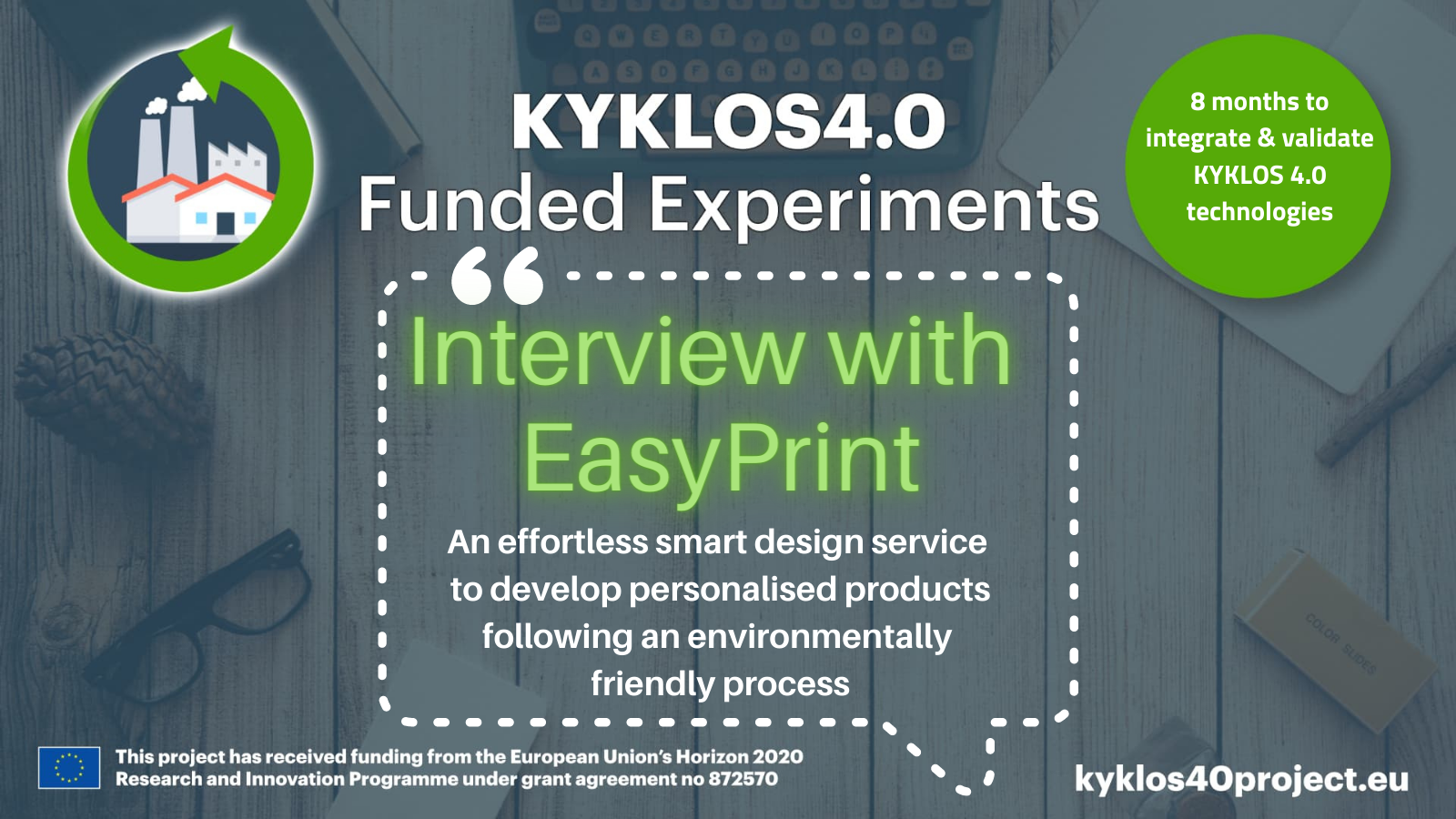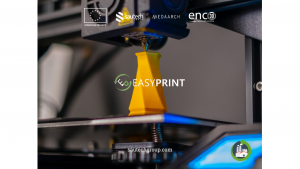
12 May Interview with the EasyPrint experiment
The KYKLOS4.0 Open Call #2 is funding seventeen experiments that are developing technological solutions of value for the manufacturing domain.
The project will be releasing a series of interviews over the course of the coming weeks with the objective of promoting the work being implemented in these experiments and allowing our readers to understand potential uptake of the solutions being developed by them.
This is the eighth of the seventeen interviews with the experiments funded under the open call. Today, we interview the EasyPrint experiment.
* * * * *
Explain your project in one sentence.
EasyPrint provides a smart design service to develop personalised products following an environmentally friendly process. The EasyPrint platform enables customer-oriented design for additive manufacturing products where customers provide specific requirements for a single customised product and 3D printing manufacturers convert them into product specifications.
How is KYKLOS4.0 project and the selected services (and components) bringing value to your project?
The development process entails the following workflow: the customer presents to the experts of the additive manufacturing process a 3D file (OBJ) generated using one of the many available 3D modelling software. Each product sample to be printed is coupled with personalised parameters provided by the customer that must be translated into a printable project specification. The main problem encompasses several parameter combinations and prototyping processes to be evaluated in order to find the best solution for the customer. The resulting process appears time-consuming and would benefit from software support to automate at least partially the prototyping step, so as to reduce the number of printing hypotheses to be explored. The functional support software has a file archive to keep track of the various alternative print settings, to easily manage and explore the prototyping history of the product. In addition, the support platform facilitates setting up a product that takes into account the environmental impact of its production, in the spirit of encouraging additive manufacturing towards a more sustainable production cycle. In addition, stakeholders would like the end customer to participate in the prototyping process of the product, to speed up the evaluation phases of production, and to facilitate the exchange of ideas between customers and the technical department. To this end, another functionality is a communication channel between the end customer and the stakeholder’s administrative department, which could be used to send a quotation for the realisation of the product.
How is your solution contributing to circular manufacturing?
EasyPrint allows 3D printing centres and additive manufacturing industries to re-engineer product development from design to production. The use of polymer-based materials and IoT will contribute significantly to the creation of a new green manufacturing industry based on a cradle-to-cradle approach. EasyPrint will enable the regeneration, reprocessing and recycling of materials, extending product lifetime and avoiding the production of unsold products. In particular, the impact in terms of circular economy is to be found in:
- the upstream use of materials with high environmental performance;
- the reduction of stored raw materials in relation to the optimisation of 3D printing processes and company workflows;
- the reduction of natural resources as primary feedstock needed in the production process;
- the awareness of environmental issues that the EasyPRINT platform succeeds in making by informing users of the footprint that their choice of print produces in relation to different materials;
- educating users to the circular economy paradigm and principles by promoting the reuse of polymeric waste.
The measure of circularity will be calculated through Feedstock Intensity (FI) and Circular-Process Feedstock Intensity (CPFI) indices.
How will your solution be replicated and used in other manufacturing environments?
The innovation fields reflect EasyPRINT’s focus on research and development. On EasyPRINT platforms, knowledge is distributed, created and exchanged, providing the basis for developing innovations, their dissemination and use. Members of the platforms generally share ideas, provide feedback on existing projects and exchange information on new solutions, enabling important knowledge spillovers free of charge in any sector. EasyPRINT can support and facilitate the process of exploiting cutting-edge AM materials, technologies and applications. The EasyPRINT platform enables the formation of communities that evolve around common interests in hobbies, products, tools and practices, extending its application to several sectors. Through creation and customisation, EasyPRINT enables all who use it to meet and exceed their own needs. The EasyPRINT platform overcomes obstacles and complexities, with excellent application in aerospace, automotive, medical, transport, architecture, Art & Design, etc. In addition, 3D printing also offers more solutions in the field of robotics, enabling the rapid production of more efficient and realistic robots. As additive manufacturing becomes more democratised and more accessible, with EasyPRINT we can see a significant increase in developments in every field.
What advice would you give to companies wishing to make their manufacturing processes more circular?
Additive manufacturing is a technology that makes it easy to adhere to the circular economy paradigm. Companies wishing to pursue the circular economy should invest in improving resource efficiency during production processes. Efficiency can be ensured by combining simulated printing processes before production, optimised automation of print paths, and the ability to use digital archiving techniques to validate which products are or will be most in demand by customers. In fact, digital files can be shared globally in the form of virtual inventories and produced locally, instead of physically shipping parts and finished products. In addition, creating a digital 3D printing platform can bring together different production cycles to make the service more efficient and sustainable, including for end users. Companies should be increasingly customer-oriented. In this sense, the customer’s experience and relationship with the end product can help achieve the principles of the circular economy. Products should be designed to be produced efficiently with AM technology; this would reduce waste by optimising materials during the production process, time and CO2 emissions.

* * * * *
About the EasyPrint project
The EasyPrint project – Engine for the Assessment of SYstem PRINTing – is implemented by three partners: SAUTECH srl (Italy), MEDAARCH (Italy), ENCO srl (Italy).
Summary: The main objective of the project is to provide an effortless smart design service to develop personalised products following an environmentally friendly process

